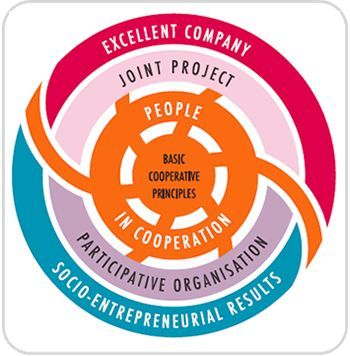It may not be the revolution’s dawn, but it’s certainly a glint in the darkness. On Monday, this country’s largest industrial labor union teamed up with the world’s largest worker-cooperative to present a plan that would put people to work in labor-driven enterprises that build worker power and communities, too.
Titled “Sustainable Jobs, Sustainable Communities: The Union Co-op Model,” the organizational proposal released at a press conference on March 26 in Pittsburgh, draws on the fifty-five year experience of the Basque-based Mondragon worker cooperatives. To quote the document:
“In contrast to a Machiavellian economic system in which the ends justify any means, the union co-op model embraces the idea that both the ends and means are equally important, meaning that treating workers well and with dignity and sustaining communities are just as important as business growth and profitability.”
It might not sound like big news to members of their local food coop but it’s revolutionary stuff in the context of industrial production. The United Steelworkers represents some 1.2 million members; the average steel plant requires millions of dollars of investment, and there’s history here when it comes to worker ownership—some of it painful.
Thirty-five years ago, when local steelworkers and a statewide religious coalition put forward a plan to transfer the Youngstown Sheet and Tube steel mill to worker and community control, the USW’s attitude was very different. As recounted by Gar Alperovitz in his (recently updated) "America Beyond Capitalism:"
“In the late 1970s the union saw worker-ownership as a threat to organizing, and it opposed efforts by local steelworkers to explore employee-owned institution-building in cities like Youngstown.”
This Monday, Leo Gerard, forward-thinking president of a very new kind of international USW, had this to say:
“To survive the boom and bust, bubble-driven economic cycles fueled by Wall Street, we must look for new ways to create and sustain good jobs on Main Street…. Worker-ownership can provide the opportunity to figure out collective alternatives to layoffs, bankruptcies, and closings.”
“The union’s gone through a huge transition,” Alperovitz told me when I reached him at his office shortly after the press conference. “This is a real declaration of a new direction for labor.”
It’s been a few years since the USW first became curious about the Mondragon cooperatives after they had a good experience working with GAMESA, a co-op friendly Spanish wind turbine outfit that opened up three plants in Pennsylvania. In 2009, with their Spanish colleagues' help, Gerard sent a delegation to the Basque region of Spain to investigate Mondragon, now a $24 billion global operation. Since then, the USW has worked slowly with Mondragon and the Ohio Employee Ownership Center (OEOC) a university based coop-outreach center founded by one of the organizers of the Youngstown initiative, to fine tune the US version presented Monday.















